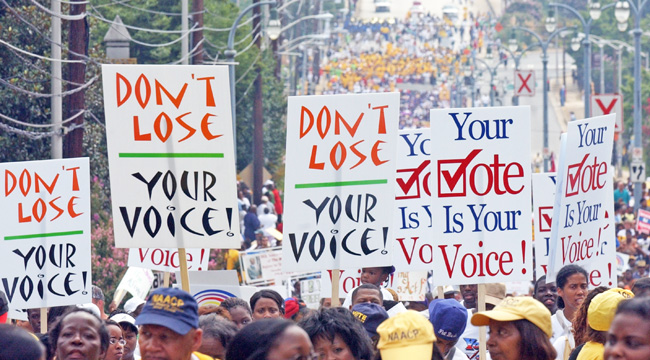
As fears of voter suppression heat up ahead of what is sure to be a contentious 2018 midterm election cycle, Georgia is cleaning up its voter registration lists and sweeping 591,548 voters who haven’t updated their information in three years or more. That half a million voters seems like a lot given that the ultra-close Georgia special election between Karen Handel and Jon Ossof came down to a matter of just 9,702 votes in June. The state claims this is a necessary measure to avoid fraud. Watchdog groups are wary of language that sounds similar to the rhetoric around Trump’s Presidential Advisory Commission on Election Integrity, which many (including the ACLU) fear is part of a massive campaign to disenfranchise otherwise eligible voters.
It’s not all doom and gloom. Cleaning up voter registration rolls is pretty standard. For example, the U.S. Election Assistance Commission recorded the removal of 732,800 voters from the Georgia list between 2014 and 2016. The people removed include those who moved away or passed up opportunities to update their addresses or name changes. That means less clutter for Georgia election workers to sift through, and it ostensibly reduces opportunities for very rare occasions of voter fraud.
The problem is that Fulton County sent out notices to voters asking them to update their information in a way that was a little panic-inducing for some. For voters who don’t understand or know about the difference between “active” and “inactive” voter registration, being put on the inactive list could make some think they are no longer eligible to vote when actually they are still entitled to a ballot. According to the ACLU, voter suppression can be as simple as making it hard to understand if you’re able to vote or not.
The other concern is that, while Georgia’s efforts to clean up its voting lists are pretty routine, they’re still part of a larger Justice Department initiative to remove ineligible voters from lists in 44 states. That feeds into concerns that the Presidential Advisory Commission on Election Integrity is actively trying to disenfranchise voters. It was born out of Trump’s belief he would have won the popular vote in the election if it weren’t for voter fraud — of which no actual evidence exists. The Commission is seeking personal information about voters that some see as an intrusion and has already inspired some privacy-minded citizens to forfeit their right to vote over fears of government intrusion. Whether intentional or not, those are legitimate voters that were ultimately suppressed in the President’s quest for validation.
